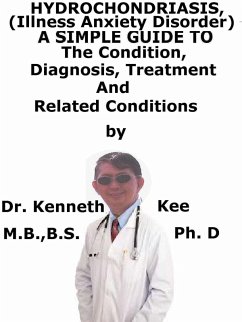I'm a hypochondriac.
Yesterday it was brain damage from the vodka the night before.
Today, heart attack - my arm and chest started hurting at the same time.
---Lisa Marie Presley
Hypochondriasis is a neurotic disorder with the excessive belief that real or imagined physical symptoms are signs of a serious illness in the body despite medical reassurance and other evidence to the contrary.
It is always linked with anxiety or depression about negative medical examinations.
Some people have extreme and improbable worries about their health.
They are very concerned about getting a disease or are convinced they have a disease, even after medical tests show they do not.
These people often misread minor health disorders or normal body functions as symptoms of a severe disease.
This disorder used to be called hypochondria.
Now it is called illness anxiety disorder based on classification by the DSM-V.
Causes:
The exact cause of illness anxiety disorder is not known.
Causes that might be involved in the development of the disorder are:
1.A history of physical or sexual abuse
2.A history of having a serious illness as a child
3.A poor ability to express emotions
4.A parent or close relative with the disorder; children might learn this behavior if a parent is overly concerned about disease and overreacts to even minor illnesses
5.An inherited susceptibility for the disorder
There is no organic source for the patient's symptoms.
People with hypochondria are always worried about their physical health.
Symptoms
People with illness anxiety disorder are worried about having a physical illness.
The symptoms they present can range from general complaints, such as pain or tiredness to worries about normal body functions, such as breathing or stomach noises.
People with illness anxiety disorder are not faking or lying about their symptoms.
They truly believe they are sick.
Diagnosis:
Diagnosing illness anxiety disorder can be very difficult; because people with the disorder are convinced their symptoms and feelings of distress are explainable by a medical illness.
If the doctor finds no physical cause for the symptoms, he or she might refer the person to a psychiatrist or psychologist.
1.There is a preoccupation about health
2.There is improper worry about minor symptoms believed to be symptoms of serious illnesses like cancer, heart or venereal disease
3.There is failure of reassurance by repeated negative examinations and investigations done based on the symptoms given.
4.The patient may persist that some illness has been unnoticed
5.Hypochondriacs are often affected often with diet and exercise fads
Treatment:
A main purpose of illness anxiety disorder treatment is to help patients live and function as normally as possible, even if they continue to have symptoms
Supportive care:
In most patients, the best course of action is for the person to stay in regular contact with a trusted doctor.
Psychotherapy:
Psychotherapy mostly cognitive therapy, can be useful in changing the thinking and behavior that add to the symptoms.
The treatment also can help the person find out better ways to deal with stress, and increase his or her social and work functioning.
Unfortunately, most people with illness anxiety disorder disagree that there are any mental or emotional problems, making them fairly resistant to psychotherapy.
A good supportive doctor-patient relationship is the best treatment.
Medicines:
Antidepressant or anti-anxiety drugs are occasionally used if a person with illness anxiety disorder also has a mood disorder or anxiety disorder
TABLE OF CONTENT
Introduction
Chapter 1 Hypochondriasis
Chapter 2 Causes
Chapter 3 Symptoms
Chapter 4 Diagnosis...
Dieser Download kann aus rechtlichen Gründen nur mit Rechnungsadresse in A, B, CY, CZ, D, DK, EW, E, FIN, F, GR, H, IRL, I, LT, L, LR, M, NL, PL, P, R, S, SLO, SK ausgeliefert werden.


